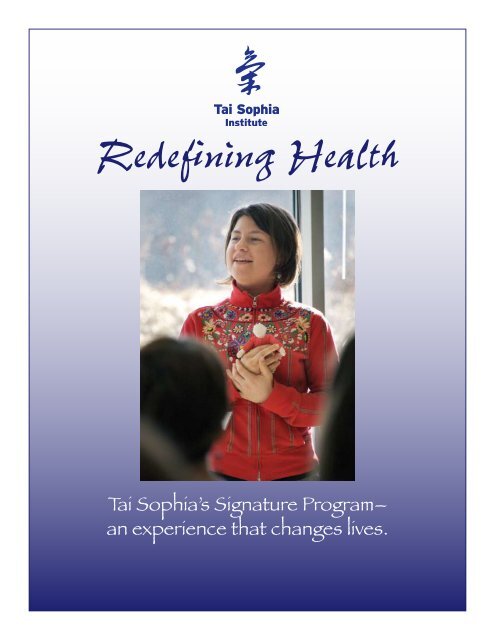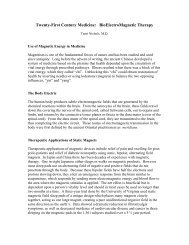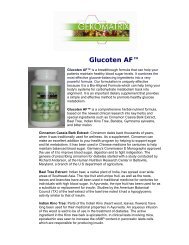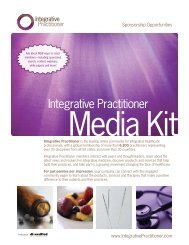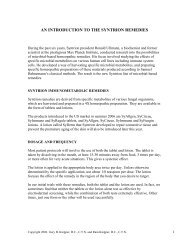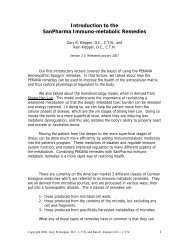Redefining Health - Integrative Practitioner
Redefining Health - Integrative Practitioner
Redefining Health - Integrative Practitioner
You also want an ePaper? Increase the reach of your titles
YUMPU automatically turns print PDFs into web optimized ePapers that Google loves.
<strong>Redefining</strong> <strong>Health</strong><br />
Tai Sophia’s Signature Program–<br />
an experience that changes lives.
Reprinted from The Report, Spring 2009<br />
<strong>Redefining</strong> Everything<br />
An experience that changes lives<br />
Participants share their stories . . .<br />
Although the computerized records don’t go back to the<br />
early seventies when <strong>Redefining</strong> <strong>Health</strong> (RDH) was first<br />
offered in a different form, it’s safe to say that over the last<br />
35 years, thousands of people have experienced some form<br />
of Tai Sophia’s signature workshop, delivered by co-founders<br />
Dianne Connelly and Bob Duggan.<br />
Initially, Dianne and Bob welcomed an audience coming<br />
to learn about acupuncture and its needling process. The<br />
program evolved as participants sought to become the<br />
needles themselves, and as the SOPHIA program developed<br />
in the late 1980s. Recognizing that RDH is at the philosophical<br />
roots of everything Tai Sophia offers, Dianne describes it as<br />
an “overture,” explaining that “like any overture, it heralds<br />
different facets of a whole symphony and plays them out.”<br />
Bob points out that for each RDH session, “what goes on<br />
depends on who shows up,” and Dianne suggests that it’s “all<br />
about shining on each other.” And that’s what these pages<br />
are about: shining on a few of the many who have shown up<br />
for <strong>Redefining</strong> <strong>Health</strong> and who have redefined their lives in<br />
inspiring ways.<br />
Of course an exploration of <strong>Redefining</strong> <strong>Health</strong> would be<br />
incomplete without shining a little on Dianne Connelly and<br />
Bob Duggan. Both delight in the balancing dance of teaching<br />
together, and recognize that they make sure different things<br />
happen in different ways. Although they may come with<br />
different approaches, both Dianne and Bob see the work as<br />
high-stakes and are committed to being fully present for it.<br />
Says Bob, “It’s risky doing this work in front of large groups.<br />
People are dealing with pretty potent attachments, and we<br />
are asking them to let go.” When asked if he likes being the<br />
voice of challenge, Bob offers an emphatic “No!” and laughs.<br />
Still, he pushes through, knowing that part of “being a healer is<br />
carving into a space that’s uncomfortable for people.”<br />
Dianne identifies the challenge of remembering to teach RDH<br />
for the sake of the attendees, to let go of any insecurities, and<br />
to be in embodied practice herself. Dianne asks, “Do I forget<br />
sometimes Yes. And I’m committed to not forgetting.” She<br />
smiles and adds, “It’s all about love, really.”<br />
Ultimately, <strong>Redefining</strong> <strong>Health</strong> was never a task designed for<br />
a select few. It remains the charge of two virtuoso teachers<br />
and all of us to use wisely the power we have within us: to<br />
redefine not just health, but everything.<br />
During each <strong>Redefining</strong> <strong>Health</strong> weekend, Bob Duggan and Dianne<br />
Connelly masterfully work with attendees to reframe issues or<br />
concerns in their lives. Above, Bob provides coaching to Andrew<br />
Reiner, a participant in February 2009.<br />
<strong>Redefining</strong> Family<br />
For Cecil Rosen, one of the eye-openers in <strong>Redefining</strong><br />
<strong>Health</strong> was that he is constantly in the process of writing<br />
his life stories and in charge of the way he writes them, one<br />
chapter at a time. Both Cecil and Karen, his wife of over 40<br />
years, took this realization deeply to heart as they moved<br />
through Karen’s diagnosis of brain cancer and the treatment<br />
that followed. They found that in one of the hardest parts of<br />
their lives, they were able, as Cecil says, “to find and create joy<br />
in virtually everything we did.”<br />
Karen was diagnosed in June of 2004 and was unable to<br />
continue in her role as professor of marriage and family
therapy at Virginia Tech. At that time, Cecil quit his job as a<br />
business executive to become a full-time caregiver for Karen.<br />
Their son Jeff, an internet software developer who had been<br />
living in San Diego, moved back to Virginia in 2004 to support<br />
his parents with the help of his brother Mike, a realtor and real<br />
estate investor.<br />
From that time until Karen’s death in April 2008, the Rosens<br />
shared a number of joyful celebrations and adventures,<br />
including Mike’s marriage to Jenny in April 2005. Also, in<br />
early 2005, Karen and Cecil began driving from their home<br />
in Virginia to Laurel for acupuncture treatments with Dianne<br />
Connelly.<br />
Through Dianne, the Rosens learned of <strong>Redefining</strong> <strong>Health</strong> and<br />
came to the October weekend with Jeff and Mike. Cecil found<br />
it an important way for the family to get on the same page and<br />
to find “the positive aspects of the most dire situations.” As<br />
Cecil explains, Karen’s brain cancer, with the most aggressive<br />
form of tumor, left her with a prognosis of six to eight months<br />
to live. Instead, she survived almost four years, with Karen and<br />
her family managing to truly enjoy the time they had together<br />
— made possible, as Mike explains, by one of the gifts of<br />
RDH: “Just because it is raining outside doesn’t mean that it<br />
is bad weather. We have a choice to see the rain as good or<br />
bad.”<br />
Cecil describes Karen as having a gift for interpersonal<br />
relationships, carrying herself with grace, and acting as a model<br />
for the rest of the family. Says Cecil, “RDH helped the rest of<br />
us by giving us the tools and context to grow in many of the<br />
ways that we saw and experienced in Karen.”<br />
Numerous practices from RDH touched the Rosens, from<br />
living life in ways that honor the ancestors and serve future<br />
generations, to “keeping the lid on the rice pot moving,” to<br />
using words as treatments, to always drawing the circle big<br />
enough. And the<br />
Rosen family circle<br />
became a little bigger<br />
in 2006 with Jeff’s<br />
marriage to Cristina,<br />
and then again in<br />
2007 with the birth of<br />
Jeff and Cristina’s son<br />
Reece. When Reece<br />
was born, Karen<br />
decided to give the<br />
gift of a photo album<br />
and memory book<br />
to her new grandson.<br />
After Karen’s death,<br />
Cecil finished the<br />
work Karen began<br />
and gave the album to<br />
For the Rosen family (above) <strong>Redefining</strong> <strong>Health</strong> was ultimately a<br />
way to “bring a family closer.” Pictured (from the upper left) are<br />
Cecil Rosen and his sons Jeff and Mike. Christina, Jeff’s wife, holds their<br />
son Reece. Seated on the right is Jenny, Mike’s wife.<br />
Practices you can use<br />
When you find yourself upset,<br />
remember you have a choice:<br />
Upset is optional.<br />
Reece for his first birthday, with the intent to connect him to<br />
his ancestors.<br />
Cecil explains that “both <strong>Redefining</strong> <strong>Health</strong> and our<br />
relationship with Dianne Connelly as a clinician played major<br />
roles in helping all of us find ways to navigate this brain cancer<br />
journey with joy, peace, and happiness.” And Dianne played an<br />
important part in the service celebrating Karen’s life.<br />
This past fall, Mike and<br />
Jeff continued the family’s<br />
commitment to RDH and<br />
brought their wives Jenny and<br />
Cristina to the October 2008<br />
weekend. For Cristina, the<br />
workshop offered a great way<br />
to experience connection,<br />
both with her husband and<br />
other loved ones, and ultimately<br />
a way to “bring a family closer.”<br />
Since their RDH experiences,<br />
Cecil also notices that his family is<br />
more inclined to talk about how<br />
they feel, to listen to each other, and to appreciate shared<br />
moments. “We tend to look at all problems or crises as<br />
opportunities and possibilities. That practice has become so<br />
firmly engrained that we hardly notice as it happens.”<br />
Says Cecil, “We had a great start with Karen as a friend,<br />
wife, and mother. The <strong>Redefining</strong> <strong>Health</strong> experience gave us<br />
additional practical and down-to-earth ways to enhance our<br />
experiences of each other and the world around us.”<br />
<strong>Redefining</strong> Learning<br />
Cecil & Karen Rosen used the<br />
<strong>Redefining</strong> <strong>Health</strong> experience<br />
to navigate Karen’s brain cancer<br />
journey “with joy, peace, and<br />
happiness.”<br />
Every day, 26-year-old Dawn Furfaro wears a red ribbon<br />
on her wrist. It often comes untied, which, she says, is good<br />
because the ribbon reminds her of whatever daily practice<br />
she’s chosen from her storehouse of <strong>Redefining</strong> <strong>Health</strong><br />
experiences. Out of the last six RDH workshops offered at<br />
the Institute, Furfaro has attended five. In a culture where<br />
learning is often approached as a one-time deal, Furfaro goes<br />
against the grain in coming back. “Every time I take a different<br />
piece in a different way.”<br />
For instance, at her second RDH, she watched someone<br />
“walk the circle.” This person was struggling to forgive, and<br />
pushing back in a conversation with Bob. Ultimately, this<br />
person decided to forgive for the sake of his daughter. Dawn<br />
says it was incredible to see that; and she could easily apply it<br />
to a similar situation for herself. After watching this person’s<br />
moment of forgiveness, she asked herself, “If this is possible,
what am I doing holding these things”<br />
In her commitment to making the circle of learning as big as<br />
possible, she introduced her fiancé, Cole, to the program; and<br />
he’s attended almost as many times as Dawn. Beyond Cole,<br />
she’s brought seven others to RDH, sometimes offering it as a<br />
gift to friends and paying their way.<br />
Dawn Furfaro introduced her fiancé,<br />
Cole, to <strong>Redefining</strong> <strong>Health</strong> — a<br />
program so meaningful and useful to<br />
them that they’ve retaken it several<br />
times.<br />
Originally, Dawn came<br />
to Maryland as a premed<br />
student. Stemming<br />
from 11 years of health<br />
problems and a “huge<br />
fight with pain,” Dawn<br />
wanted to be a doctor<br />
and to “actually spend<br />
time with people” in that<br />
role. Dawn was still in a<br />
great deal of pain when<br />
she started acupuncture<br />
treatment with Dianne<br />
Connelly, which led her<br />
to attend <strong>Redefining</strong><br />
<strong>Health</strong> for the first time<br />
in February 2007. Says<br />
Dawn, both Dianne and<br />
RDH gave her a new<br />
framework for living.<br />
The program has a profound connection with Dawn’s<br />
experience of education; and she often uses what she’s<br />
learned in RDH in her studies, now as a Peace Studies major<br />
at Goucher College. Amidst her struggle with illness and<br />
pain, Dawn says she went from loving school to hating school.<br />
Through the RDH practices, she’s found a way to love school<br />
and learning once again. She was amazed that it was her choice<br />
to create upset and suffering; and for her, remembering that<br />
“upset is optional” calls her to all the other RDH learnings and<br />
practices.<br />
Recognizing that the messenger can have as powerful a role<br />
as the message, Dawn has been deeply touched by Bob and<br />
Dianne as teachers. She loves the way they teach together and<br />
that their teaching comes from lived experience. Says Furfaro,<br />
“They love us in their teaching. I know that when I’m there.”<br />
And she’s not done with RDH yet. Says Furfaro, “I’ll keep<br />
coming as long as I can and it serves. It matters every time.”<br />
<strong>Redefining</strong> Balance<br />
For Tekla Ayers, director of Patterson Park Audubon<br />
Center in Baltimore, finding Tai Sophia was “random, but<br />
not really random at all.” Since moving to Baltimore two years<br />
ago, Tekla had been feeling off balance in many aspects of her<br />
life and had the major knots in her back to prove it. She had<br />
been living in Guatemala before she came to Baltimore. So<br />
the move brought lots of changes, along with an awareness<br />
that her support system — family in Arizona and close friends<br />
spread out far and wide — didn’t all come with her.<br />
Practices you can use<br />
When you find yourself<br />
in crisis, ask:<br />
What is the opportunity<br />
To seek balance and relief, Tekla exercised, got acupuncture<br />
treatment, and took a yoga class, where her instructor<br />
happened to be a Tai Sophia student who mentioned how<br />
cool her school was. So Tekla went to www.tai.edu, found<br />
<strong>Redefining</strong> <strong>Health</strong>, and instantly knew: “That’s what I need.”<br />
Tekla liked how the program allowed her to step back and<br />
look at the relationships in her life — from being a step-mom<br />
to a wife to a director of other employees at a nonprofit. At<br />
RDH, Tekla “got lots of tools” to deal with everything on her<br />
plate and also found things to celebrate in her own life, like her<br />
regular practice of acknowledgment with family and friends.<br />
For Tekla and others, RDH isn’t always just about discovering<br />
new ways of being; it can also be about reaffirming and<br />
remembering those ways that already serve.<br />
Like attendee<br />
Dawn Furfaro (see<br />
“<strong>Redefining</strong> Learning”),<br />
Tekla has used wearing<br />
a bracelet to remind<br />
herself that upset is<br />
optional and to take a<br />
deep breath. She’s also<br />
written phrases from<br />
the RDH weekend<br />
on her keyboard at<br />
work and shared the<br />
weekend with friends<br />
through offering them<br />
different ways of<br />
Tekla Ayers, pictured with Steve, her<br />
approaching their own husband, and son Andrew, says<br />
struggles. Tekla says that in <strong>Redefining</strong> <strong>Health</strong> she “got lots<br />
she’s definitely bringing of tools” to deal with everything on<br />
her plate, and recognized things to<br />
her husband to the<br />
celebrate in her life.<br />
next RDH; and her<br />
sister is planning her<br />
next visit around <strong>Redefining</strong> <strong>Health</strong>.<br />
In another case of one thing leading to another, during Tekla’s<br />
RDH weekend, she attended a mini open house for Tai<br />
Sophia’s Master of Arts in Applied Healing Arts. She’d been<br />
seeking graduate programs in environmental science/policy,<br />
but none she’d looked at seemed quite right. And again, in<br />
a moment, Tekla knew that this program was for her. This<br />
January, Tekla started the program and took another step into<br />
balance.<br />
To register for <strong>Redefining</strong> <strong>Health</strong> or for more information,<br />
please visit www.tai.edu or call 410-888-9048, ext. 6611.


